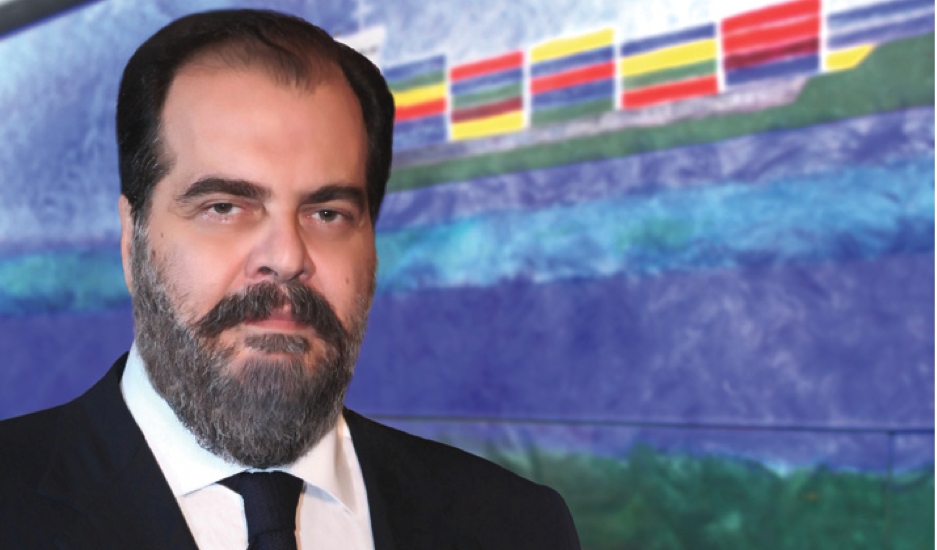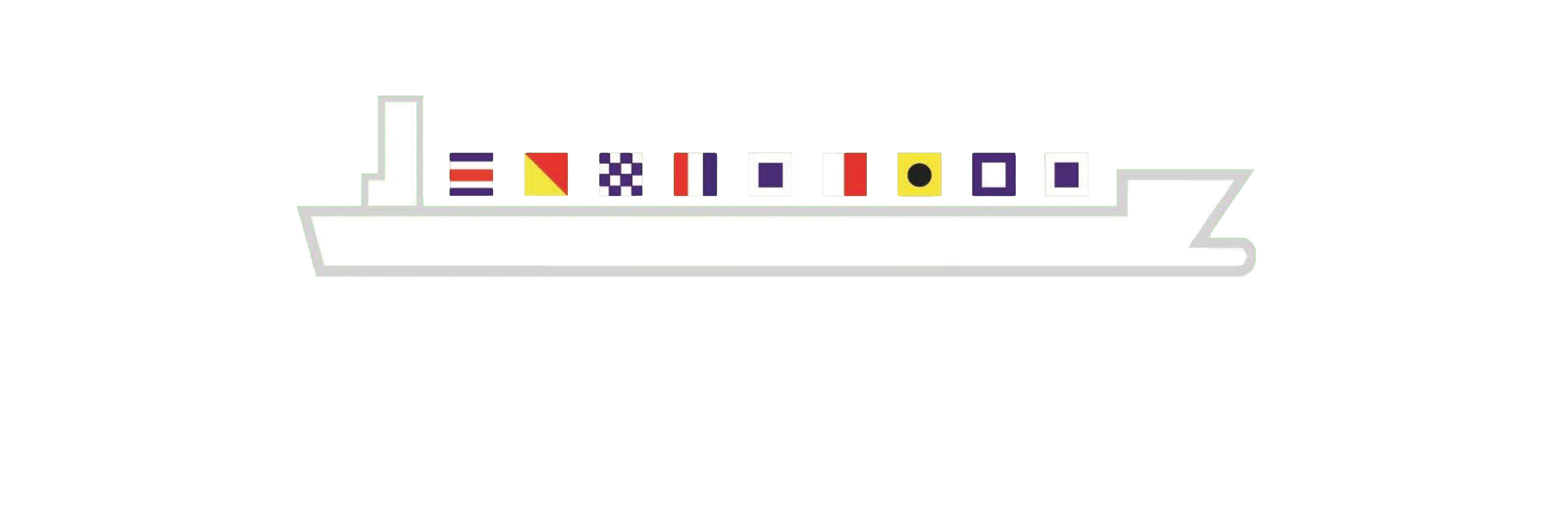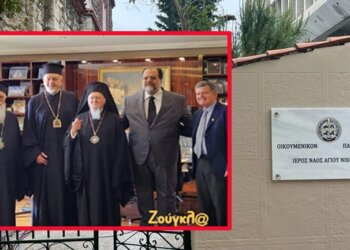- March 31, 2022
- Posted by: Contships
- Categories: News, Press

Contships’ chairman presents his views on the liner freight market, the growth strategy of his company, and the concept of a shipping company’s diversification into other shipping markets or economic sectors. Mr. Pateras, owner of 41 containers ships also discusses the growth prospects of the Greek shipyards and the contribution of the shipowning community to the needs of Greek society.
The liner freight market recorded record profits last year, while the outlook for 2022 is positive. From your experience in the shipping business, what are the best strategic moves a company can follow in times of euphoria like this?
The container freight rates have increased dramatically due to the Covid-19 pandemic because of the severe disruptions it has caused to the supply chain. Obviously, this will change once this is resolved in the coming years and the freight rates will go through a correction phase. Right now, we are observing extremely high rates compared to the previous decade, which makes all the liner companies, which were suffering financial losses over the last decade, extremely happy. The global problems will continue, and it is no longer an issue of supply or building more ships; it’s an issue of fixing the supply chain, which has a lot to do with the distribution of the cargoes on land. We can see that the US and European governments are finding it hard to find solutions in that respect. As far as we are concerned, the container feeder market sector has seen an increase in the charter rates in the region of 400%, which is substantial. Therefore, shipowners, who have acquired vessels at reasonable prices over the last few years, can make a very healthy return. It makes sense to build new ships today because the cost of a newbuilding is the same as the acquisition cost of a ten-year-old ship, but no one can be certain where the market will be three years from now when the newbuildings will be delivered.
Therefore, Contships has decided to continue to invest in sec- ond-hand vessels that are ready to trade immediately, rather than order new ships.
What are Contships’ next moves to stimulate growth? Has your strategic choice to invest in the feeder sec- tor paid off, given the exceptional high freight rates?
Our strategy to invest in the container sector has certainly paid off. Our strategy for the next 24 months is to acquire more vessels that will be in good trading condition and which we will be able to fix for a minimum period of 36 months, thus covering 70% of the investment. We are not prepared to take any chances and
make new acquisitions without having secured charters. At the same time, we are prepared to sell if we have interesting offers for any of our vessels. We currently have around $500 million in secured contracts for the next 24 months.
It is said that Greek shipping has been following the same strategy it did many years ago when it purchased Norwegian bulk carriers, only now it is buying German containerships. In your opinion, are the Greeks still adhering to this growth model that proved successful in the past, and is this annoy- ing the shipping nations whose maritime sector is shrinking?
I don’t think the German and the Norwegian markets are com- parable. Their only similarity was the tax incentives that both these countries offered to shipowners. Other than that, I think the Norwegians are far more conservative, while the Germans took a considerable risk by building a huge number of ships between 2000 and 2010. As far as Contships is concerned, we acquired our first containerships from German interests in 2015, and since then, we have purchased 49 container ships in total, out of which 43 were of German interests. We acquired these vessels either from German banks or from administrators with zero financing from German banks. Most of them needed extensive refitting and upgrading because the shipowners were unable to tackle liquidity problems to maintain their vessels properly. I believe that the German tax model was a failure in the sense that the vessels were basically built because of the tax incentives offered and the investments were not based on the prevailing market conditions.
In general, I believe that the entire European shipping market is shrinking, as has the Greek market shrunk in the last decade. That is inevitable, considering that the costs of running a ship are much lower in Asia. Therefore, many shipowners will be moving their operations to the Far East in the next 20 years, mainly due to the costs involved. I do not believe that Greece will manage to avoid the same fate as the Northern European nations in the future.
What is your idea of market diversification? Do you think a shipping company can mitigate market risks by entering other shipping markets or different eco- nomic sectors? (e.g.,real estate, construction, etc.)?
First of all, I believe that not putting all your eggs in the same basket is healthy. When it comes to shipping, if you want to expand specifically into the container market, you need to pro- ceed with great caution because this market is controlled by a few big charterers. Therefore, if you want to make an impact in this market and create a good name for yourself, you have to ensure you establish good relationships with charterers, based on the reliable services you will provide. If we wanted to go back and invest in the dry cargo sector or any other shipping sector, we would have to do it through a different entity and not through Contships because Contships has managed to build a fran- chise that should be kept separate from other types of shipping investments. Overall, I believe it is healthy for a shipowner to be involved in different sectors of the shipping market (tankers, bulkers, and so on). However, in my opinion, each entity should be kept separate if you want to create a proper franchise that will create value for you and your investors. As far as the other non-shipping investments are concerned, I think that people involved in shipping always want to diversify their investments and put some money in non-shipping activities which is the natural thing to do.
How do the shipyards in Syros and Piraeus com- pare to those of neighboring countries in terms of growth?
We are not using the Syros shipyard, but we have done more than 15 dry-dockings in the Piraeus PPA-Cosco installa- tions over the last three years. We are pleased with the quality of the work. For our ships trading in the Far East, we use ship- yards in China, Singapore, or the Philippines. For our ships in the Middle East, we use shipyards in Oman or Dubai and in the Caribbean, we go to Curacao or the Bahamas. But I would say that most of our vessels that trade in Europe and the Medi- terranean come to PPA / Cosco for drydocking. We have also established a long-term relationship with workshops in Greece which are very reliable and do excellent work.
What are your thoughts about the presence of Cosco in Greece in general?
Cosco has done an excellent job with the container terminal in Piraeus. I think that its presence is very positive for the port of Piraeus overall, and I believe they will extend the terminal further. I would be pleasantly surprised if Cosco took over one of the major shipyards and used their technical knowledge and expertise to support such an investment in Greece. I know that this is very difficult, but overall, I think that for us as a nation, Cosco is a very strong partner and we are very pleased they have made this investment in Greece.
Your support towards the Oinoussian community, which has pressing needs, especially in matters of maritime education, has been steady and unwav- ering. In your opinion, how should the Greek ship- ping community contribute to the social needs of our remote islands amid the provocative actions by Turkey?
All Greek shipowners support their homeland. Oinousses, being one of the islands very close to Turkey, needs special attention considering that we have our Maritime Academy located there. Our intention is to support and serve the numerous social needs in education, culture and public benefit in general, in our country.
Greek shipowners promote the synergy and contribution of indi- viduals and institutions that share mutual objectives and are renowned for their sensitivity and solidarity.
You may read the whole interview at Naftika Chronika, March issue 2022, here.





